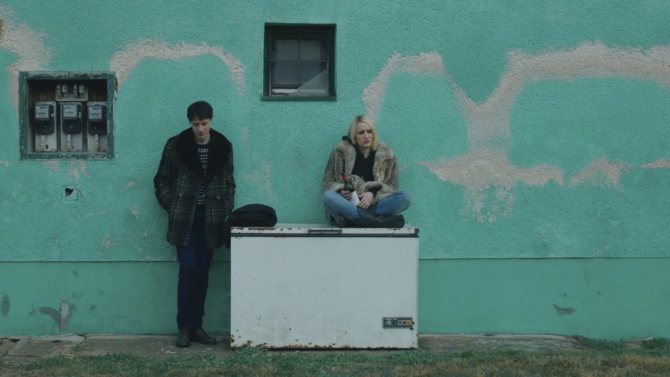
‘Afterlife’ (‘Utoelet’): Karlovy Vary Review
Hungarian veteran actor Laszlo Galffi and newcomer Marton Kristof play a dead father and his mentally unstable son in Virag Zomboracz’s unusual debut film.
A young Hungarian man with mental issues starts seeing his recently deceased father wherever he looks in Afterlife (Utoelet), an accomplished, blackly comic fable with a socio-realist edge from first-time director Virag Zomboracz. Though too understated to appeal to mass audiences, this tonally impressive balancing act should see a healthy festival life and perhaps a niche pickup or two after its world premiere at the recent Karlovy Vary Film Festival
The withdrawn, twentysomething Mozes (Marton Kristof) tries to readjust at home after an extended stay at a mental hospital. His old man, Janos (Laszlo Galffi), is an apparently tenderhearted pastor who runs several local initiatives, including a reintegration program for former addicts and couples counseling sessions for his parishioners. He is the kind of father who’s not too shy to say he’s missed his son, though Janos’s words and his actions frequently seem out of sync, at least when it comes to his own offspring. Despite the somewhat caricatured females in the family — Mozes’s aunt (Eszter Csakanyi) and mother (Krisztina Kinczli) throw a tantrum when the returnee announces he’s become a vegetarian — the early going almost feels like a Dardenne film set on the Hungarian plains: social realism with just a faint whiff of the darkly absurd.
But when Janosz drops dead at the exact moment a Jesus statue accidentally falls off a cart and hits the ground — the odd synchronicity beautifully captured by resourceful d.p. Gergely Poharnok— out goes any pretense of realism and Poharnok ushers in a style that’s part sweet if supernatural father-son fable, part deadpan comedy (the latter inaugurated when a white dove at Janos’s funeral refuses to fly, prompting the pastor to try to launch it into the sky).
Afterlife thus transforms into a story about how a son’s reluctance to let go of his father causes him to still see him everywhere, including at his own memorial service. Though initially somewhat puzzled, Mozes finds the appearances strangely comforting, especially after a wonderful scene in which Zsolti (Zsolt Anger), a local mechanic who moonlights as a psychic, tells him there’s nothing to worry about. As in many sequences, Zomboracz here manages to advance her characters and story while infusing the proceedings with unexpected touches of humor — in this case mostly derived from a visual gag involving the strategic placement of a towel.
Indeed, the director’s mise-en-scene, the visuals from Poharnok, Gyorgy Palfi‘s regular cinematographer, and the work of production designer Lilla Takacs are so atmospheric and precise that very often next to no words are needed to add humor or suggest character.
What’s also of vital importance in tonally complex pieces such as this one is that the actors never overplay things for laughs, as this could potentially damage the audience’s attachment to the characters. A perfect example of how the director and her cast get this absolutely right is in a seemingly throwaway moment in which Janos appears, sitting on his son’s bed, while Mozes happens to be masturbating. While the scene is funny, Zomboracz also ensures that audiences recognize the awkwardness of the situation for the embarrassed son; in turn, viewers find themselves inevitably identifying with a challenging character, who at first seemed to be a mousey basket case.
Newcomer Marton Kristof and veteran actor Laszlo Galffi (also briefly glimpsed in Hungarian Cannes contender White God this year) are completely on the same wavelength and clearly, Kristof is up for anything, even when events — and, to an extent, the movie — go completely off the rails during a production of the nativity play by primary-school kids that Mozes is supposedly supervising. A flashback scene that explains why he ended up in the hospital ties up various loose ends a bit too neatly; it is when the film makes unexpected or even illogical moments feel nonetheless plausible and emotionally truthful that it really shines.
Production company: KMH Film
Cast: Marton Kristof, Laszlo Galffi, Eszter Csakanyi
Writer-Director: Virag Zomboracz
Producer: Ferenc Pusztai
Director of photography: Gergely Poharnok
Production designer: Lilla Takacs
Editor: Karoly Szalai
Composer: Adam Balazs
Sales: Hungarian National Film Fund Magyar Filmunio
No rating, 90 minutes
source: Hollywood Reporter